

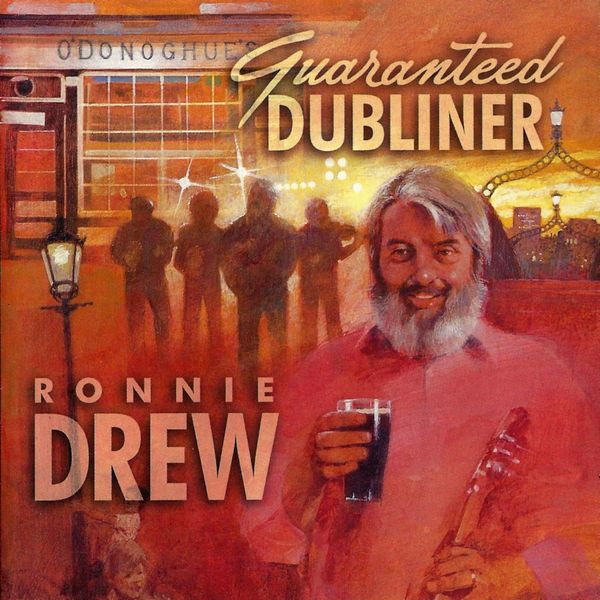 |
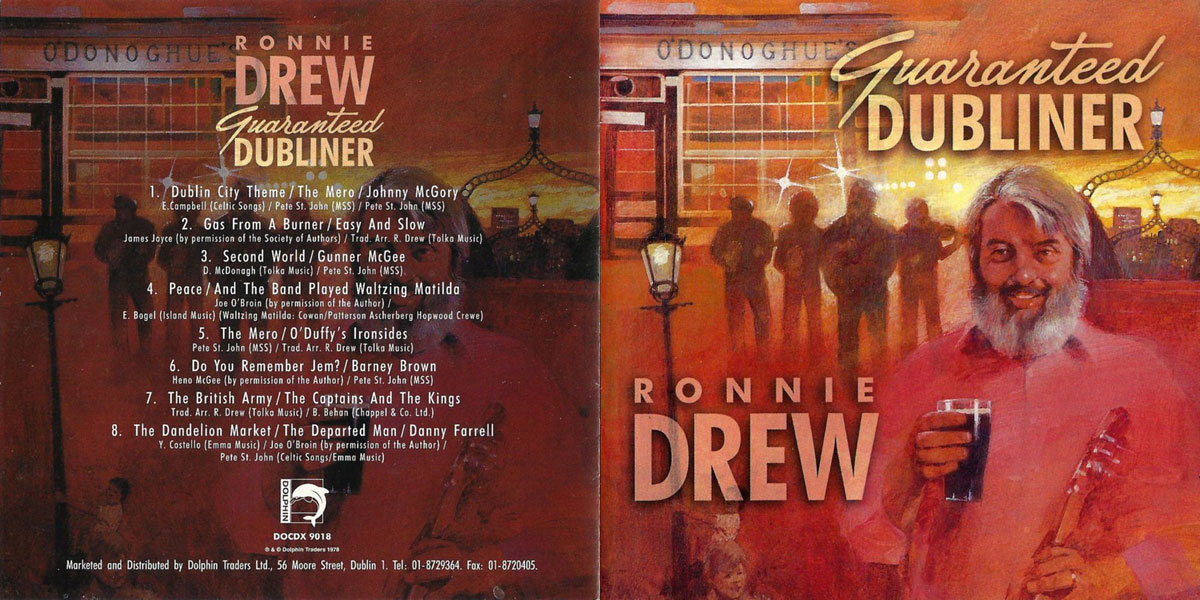
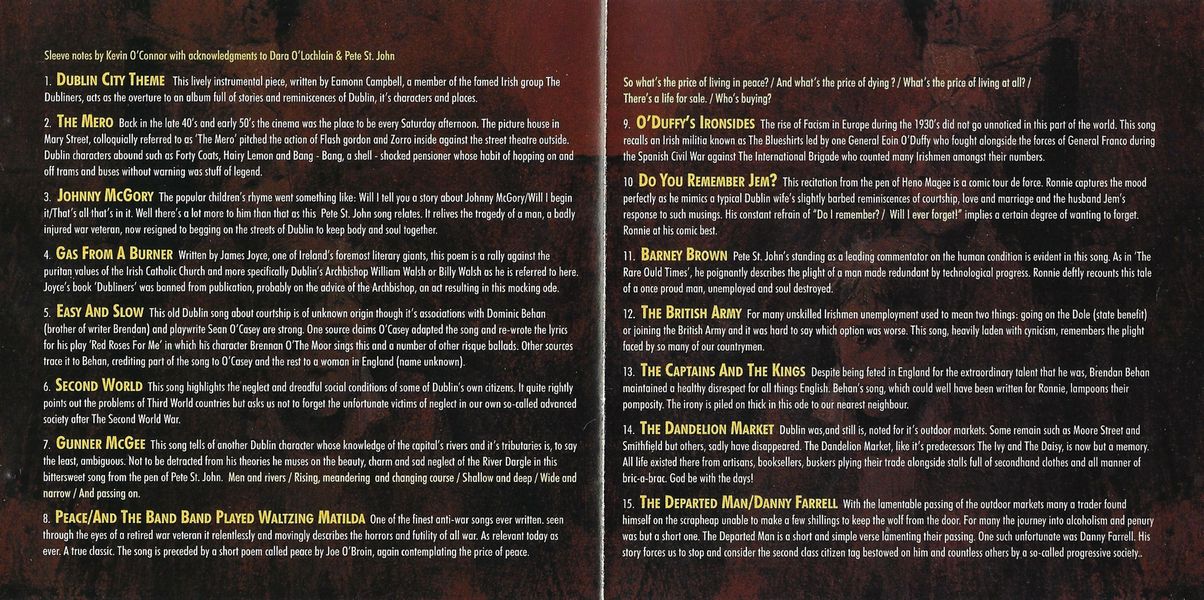 |
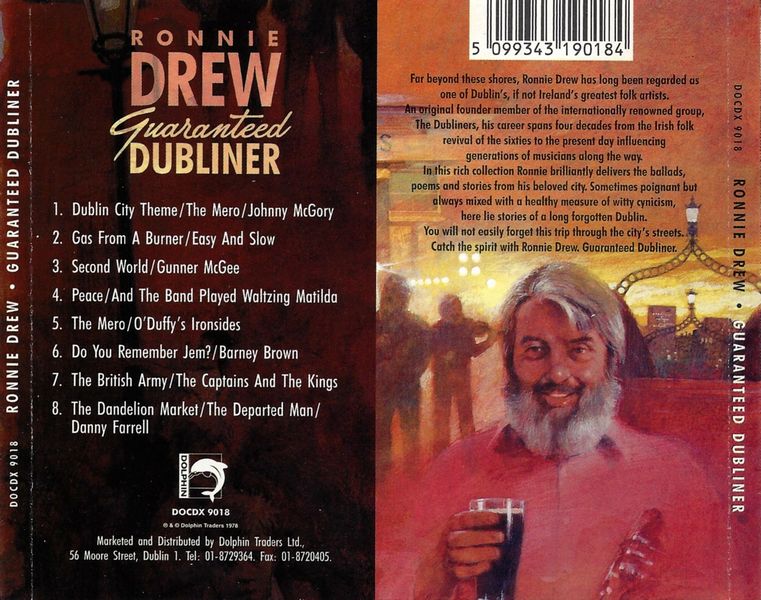
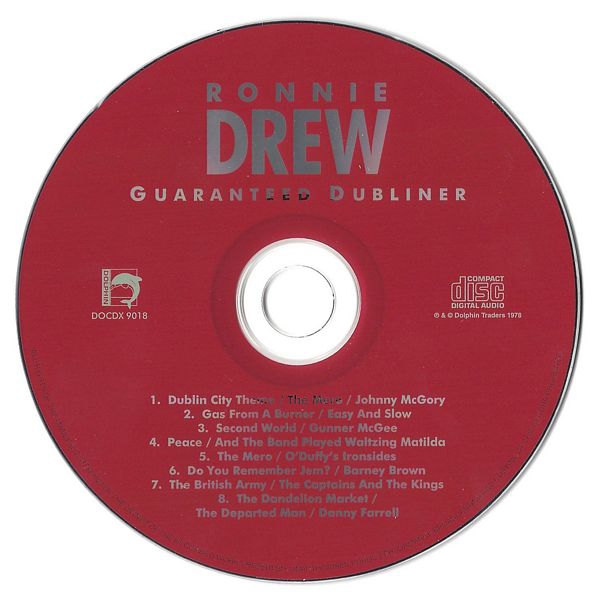 |
Sleeve Notes
Far beyond these shores, Ronnie Drew has long been regarded as one at Dublin's, if not Ireland's greatest folk artists. An original founder member of the internationally renowned group, The Dubliners, his career spans four decades from the Irish folk revival of the sixties to the present day influencing generations of musicians along the way.
In this rich collection Ronnie brilliantly delivers the ballads, poems and stories from his beloved city. Sometimes poignant but always mixed with a healthy measure of witty cynicism, here lie stories of a long forgotten Dublin. You will not easily forget this trip through the city's streets. Catch the spirit with Ronnie Drew Guaranteed Dubliner.
Sleeve notes by Kevin O'Connor with acknowledgments to Dara O'Lochlain & Pete St. John
DUBLIN CITY THEME
This lively instrumental piece, written by Eamonn Campbell, a member of the famed Irish group The Dubliners, acts as the overture to an album full of stories and reminiscences of Dublin, it's characters and places.
THE MERO
Back in the late 40's and early 50't the cinema was the place to be every Saturday afternoon. The picture house in Mary Street, colloquially referred to as 'The Mero' pitched the action of Flash Gordon and Zorro inside against the street theatre outside. Dublin characters abound such as Forty Coats, Hairy Lemons and Bang-Bang, a shell-shocked pensioner whose habit of hopping on and off trams and buses without warning was staff at legend.
JOHNNY MCGORY
The popular children's rhyme went something like, Will I tell you a story about Johnny McGory/Will I begin it/That's all that's is it. Well there's a lot more to him then that as this Pete St. John song relates. It relives the tragedy of a man, a badly injured war veteran, now resigned to begging on the streets at Dublin to keep body and soul together.
GAS FROM A BURNER
Written by James Joyce, one of Ireland's foremost literary giants, this poem is a rally against the puritan values at the Irish Catholic Church and mare specifically Dublin's Archbishop William Welsh as Billy Welsh as he is referred to here. Joyce's book 'Dubliners' was banned from publication, probably on the advice of the Archbishop, an act resulting is this mocking ode.
EASY AND SLOW
This old Dublin song about courtship is of unknown origin though it's associations with Domnic Behan (brother at writer Brendan) and playwright Seas O'Casey are strong. One source claims O'Casey adapted the song and re-wrote the lyrics for his play 'Red Roses For Me' in which his character Brennan O' The Moor sings this and a number of other risqué ballads. Other sources trace it to Behan, crediting part at the song to O'Casey and the rest to a woman is England (name unknown).
SECOND WORLD
This song highlights the neglect and dreadful social conditions of some of Dublin's own citizens. It quite rightly points out the problems of Third World countries but asks us not to forget the unfortunate victims at neglect in our own so-called advanced society after The Second World War.
GUNNER MCGEE
This song tells of another Dublin character whose knowledge of the capital's rivers and it's tributaries is, to say the least, ambiguous. Not to be detracted from his theories he muses on the beauty, charm and sad neglect of the River Dargle in this bittersweet song from the pen of Pete St. John. Men and rivers/Rising, meandering and changing course/Shallow and deep/Wide and narrow/And passing on.
PEACE/AND THE BAND PLAYED WALTZING MATILDA
One of the finest anti-war songs ever written, seen through the eyes of a retired war veteran it relentlessly and movingly describes the horrors and futility of all war. As relevant today as ever. A true classic. The song is preceded by a short poem called peace by Joe O'Broin, again contemplating the price of peace. So what's the price of living in peace?/And what's the price of dying?/What's the price of living at all?/There's a life for sale./Who's buying?
O'DUFFY'S IRONSIDES
The rise of Fascism in Europe during the 1930's did not go unnoticed in this part of the world. This song recalls an Irish militia known as The Blueshirts led by one General Euin ODuffy who fought alongside the forces of General Franco during the Spanish Civil War against The International Brigade who counted many Irishmen amongst their numbers.
DO YOU REMEMBER JEM
This recitation from the pen of Heno Magee is a comic tour de force. Ronnie captures the mood perfectly as he mimics a typical Dublin wife's slightly barbed reminiscences of courtship, love and marriage and the husband Jem's response to such musings. His constant refrain of "Do I remember?/Will I even forget!" implies a certain degree of wanting to forget. Ronnie at his comic best.
BARNEY BROWN
Pete St. John's standing as a leading commentator on the human condition is evident in this song. As in 'The Rare Old Times', he poignantly describes the plight of a man made redundant by technological progress. Ronnie deftly recounts this tale of a once proud man, unemployed and soul destroyed.
THE BRITISH ARMY
For many unskilled Irishmen unemployment used to mean two things going on the Dole (state benefit) or joining the British Army and it was hard so say which option was worse. This song, heavily laden with cynicism, remembers the plight faced by so many of our countrymen.
THE CAPTAINS AND THE KINGS
Despite being feted in England far the extraordinary talent that he was, Brendan Behan maintained a healthy disrespect for all things English. Behan's song, which could well have been written for Ronnie, lampoons their pomposity. The irony is piled on thick in this ode to our nearest neighbor.
THE DANDELION MARKET
Dublin was, and still is, noted for it's outdoor markets. Some remain such as Moore Street and Smithfield but others, sadly have disappeared. The Dandelion Market, like it's predecessors The Ivy and The Daisy, is now but a memory. All life existed there from artisans, booksellers, buskers plying their trade alongside stalls full of secondhand clothes and all manner of bric-a-brac. God be with the days!
THE DEPARTED MAN/DANNY FARRELL
With the lamentable passing of the outdoor markets many a trader found himself on the scrapheap unable to make a few shillings to keep the wolf from the door. For many the journey into alcoholism and penury was hot a short one. The Departed Mon is a short and simple verse lamenting their passing. One such unfortunate was Danny Farrell. His story forces us to stop and consider the second class citizen tag bestowed on him and countless others by a so-called progressive society.